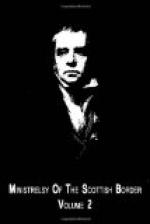—Understand’st
them well nice points of duel?
Art born of gentle blood and pure descent?
Were none of all thy lineage hang’d,
or cuckold?
Bastard or bastinadoed? Is thy pedigree
As long, as wide as mine? For otherwise
Thou wert most unworthy; and ’twere
loss of honour
In me to fight. More: I have
drawn five teeth—
If thine stand sound, the terms are much
unequal;
And, by strict laws of duel, I am excused
To fight on disadvantage.—
Albumazar,
Act IV. Sc. 7.
In Beaumont and Fletcher’s admirable play of A King and no King, there is some excellent mirth at the expence of the professors of the point of honour.
But, though such shifts might occasionally be resorted to by the faint-hearted, yet the fiery cavaliers of the English court were but little apt to profit by them; though their vengeance for insulted honour sometimes vented itself through fouler channels than that of fair combat It happened, for example, that Lord Sanquhar, a Scottish nobleman, in fencing with a master of the noble science of defence, lost his eye by an unlucky thrust. The accident was provoking, but without remedy; nor did Lord Sanquhar think of it, unless with regret, until some years after, when he chanced to be in the French court. Henry the Great casually asked him, how he lost his eye? “By the thrust of a sword,” answered Lord Sanquhar, not caring to enter into particulars. The king, supposing the accident the consequence of a duel, immediately enquired, “Does the man yet live?” These few words set the blood of the Scottish nobleman on fire; nor did he rest till he had taken the base vengeance of assassinating, by hired ruffians, the unfortunate fencing-master. The mutual animosity betwixt the English and Scottish nations, had already occasioned much bloodshed among the gentry, by single combat; and James now found himself under the necessity of making a striking example of one of his Scottish nobles, to avoid the imputation of the grossest partiality. Lord Sanquhar was condemned to be hanged, and suffered that ignominious punishment accordingly.
By a circuitous route, we are now arrived at the subject of our ballad; for, to the tragical duel of Stuart and Wharton, and to other instances of bloody combats and brawls betwixt the two nations, is imputed James’s firmness in the case of Lord Sanquhar.
“For Ramsay, one of the king’s servants, not long before Sanquhar’s trial, had switched the earl of Montgomery, who was the king’s first favourite, happily because he tooke it so. Maxwell, another of them, had bitten Hawley, a gentleman of the Temple, by the ear, which enraged the Templars (in those times riotous, and subject to tumults), and brought it allmost to a national quarrel, till the king slept in, and took it up himself.—The Lord Bruce had summoned Sir Edward Sackville (afterward earl of Dorset), into France, with a fatal compliment, to take death from his hand.[A] And the much lamented Sir James Stuart, one of the king’s blood, and Sir George Wharton, the prime branch of that noble family, for little worthless punctilios of honor (being intimate friends), took the field, and fell together by each others hand."—WILSON’S Life of James VI. p. 60.




